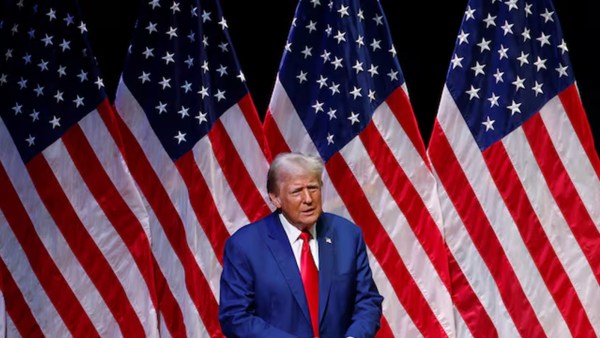US Presidential Elections 2024: All you need to know about 2024 elections in the United States
With less than two months remaining until Election Day and just hours before Alabama began mailing early ballots on September 11, the recent debate offered a critical insight into the contentious presidential race. In their first and potentially sole debate before the election, Kamala Harris presented a strong case against Donald Trump, confronting him on issues such as abortion, immigration, the Israel-Gaza conflict, the Russia-Ukraine war, and the state of American democracy, highlighting their starkly differing visions for the country.
Here are the Top 10 FAQs on the 2024 U.S. Presidential Elections:
1. Who are the candidates and how are they nominated?
The two major political parties nominate their presidential candidates through a series of state primaries and caucuses, where voters express their preferences for who should lead the party in the general election. In the Republican Party, former President Donald Trump secured his party’s nomination with a significant lead over his opponents, officially becoming the Republican nominee at the party convention in Milwaukee, Wisconsin. On the Democratic side, Vice President Kamala Harris entered the race after President Joe Biden withdrew, with no other Democrats contesting her candidacy. Additionally, there are independent candidates running for president.

2. Who is Kamala Harris?
 Harris is recognized for her advocacy on issues such as criminal justice reform, healthcare, and immigration.. (File)
Harris is recognized for her advocacy on issues such as criminal justice reform, healthcare, and immigration.. (File)
On July 21, U.S. President Joe Biden announced his decision to step back from the 2024 presidential race and endorsed Vice President Kamala Harris as the new party nominee. Harris’s nomination for the upcoming November elections would be historic, mirroring her achievement in 2020 when she became the first woman, Black woman, and person of South Asian descent to serve as Vice President of the United States. Harris, who has been in office since January 20, 2021, was previously the junior senator from California from 2017 to 2021 and served as the Attorney General of California from 2011 to 2017. She is recognized for her advocacy on issues such as criminal justice reform, healthcare, and immigration.
3. Who is Donald Trump?
 Republican presidential nominee and former U.S. President Donald Trump (REUTERS)
Republican presidential nominee and former U.S. President Donald Trump (REUTERS)
Donald Trump is an American businessman, television personality, and politician who served as the 45th president of the United States from January 20, 2017, to January 20, 2021. For the 2024 elections, he has secured the Republican nomination. Before his political career, Trump was known for his real estate business and for hosting the reality show “The Apprentice.” He is a key figure in the Republican Party, known for his unconventional approach and controversial policies.
4. When will voting for the 2024 U.S. Presidential Election take place?
The election is scheduled for Tuesday, November 5, 2024. The winning candidate will hold office for a four-year term starting in January 2025. The president has the authority to enact certain laws independently but generally needs to collaborate with Congress to pass legislation. On the global stage, the U.S. president has significant latitude in foreign affairs and representing the country internationally.
5. What are the key issues dominating the 2024 election?
Key issues include the economy, healthcare, climate change, immigration, national security, and social justice. The specific emphasis of the campaign may evolve as the election date approaches.
The Democrats are considered the more liberal party, advocating for civil rights, a broad social safety net, and initiatives to combat climate change. The Republicans, also known as the GOP or Grand Old Party, represent conservative values, promoting lower taxes, government reduction, gun rights, and stricter immigration and abortion policies.
6. How do primaries and caucuses work in the 2024 election cycle?
Primaries involve party members voting for their preferred candidates, while caucuses are gatherings where discussion and voting occur. Each state has its own unique process, and the results determine the delegates who will support candidates at the national party conventions.
7. What is the Electoral College, and how does it work?
The Electoral College consists of electors from each state who officially elect the President and Vice President. The number of electors from each state corresponds to its congressional representation (Senators and Representatives). A candidate must secure a majority of electoral votes to win the presidency.
8. What role do debates play in the presidential election?
Presidential debates provide candidates with a platform to present their policies and answer questions from moderators and the public, giving voters an opportunity to observe candidates discussing and defending their positions on various issues.
9.What are the potential impacts of the 2024 election on future policies?
The election results will significantly influence U.S. domestic and international policies. Depending on the winning candidate, there could be major changes in areas such as healthcare, economic policy, environmental regulations, and foreign relations.
10. Who can vote in the U.S. presidential election?
Most U.S. citizens aged 18 and over are eligible to vote in the presidential election. All states, except North Dakota, require individuals to register to vote, with each state having its own registration process and deadline
Disclaimer: The copyright of this article belongs to the original author. Reposting this article is solely for the purpose of information dissemination and does not constitute any investment advice. If there is any infringement, please contact us immediately. We will make corrections or deletions as necessary. Thank you.





